In the growing competition of travel apps, it’s important to sustain and find effective options for monetization.
Do you own a travel app but are unaware of a suitable monetization strategy for it?
Well, no need to worry. We have an array of travel app money-making strategies suitable for your business.
Here, we have discussed it all for you beginning with the basics, reasons, frameworks, and steps to implement them.
Are you ready to begin the journey with us?
Basics of Travel App Monetization
Let’s break down the term first.
Mobile app monetization is a process and method employed by app developers to generate revenue from mobile applications.
A travel app is software that helps individuals to specifically use the data over smaller devices for proceeding with booking hotels, or for planning travel.
When you enter the business of travel apps, it’s vital to know the patterns for generating revenue, right?
Well, travel app monetization is all about identifying the top money-making strategies for generating business revenue.
Now the question is “Why monetize a travel app?”
Why Monetize a Travel App?
Before you evaluate “how a travel app makes money?” you should learn about the reasons.
There can be various reasons to consider for monetizing a travel app.
Let’s evaluate them all below.
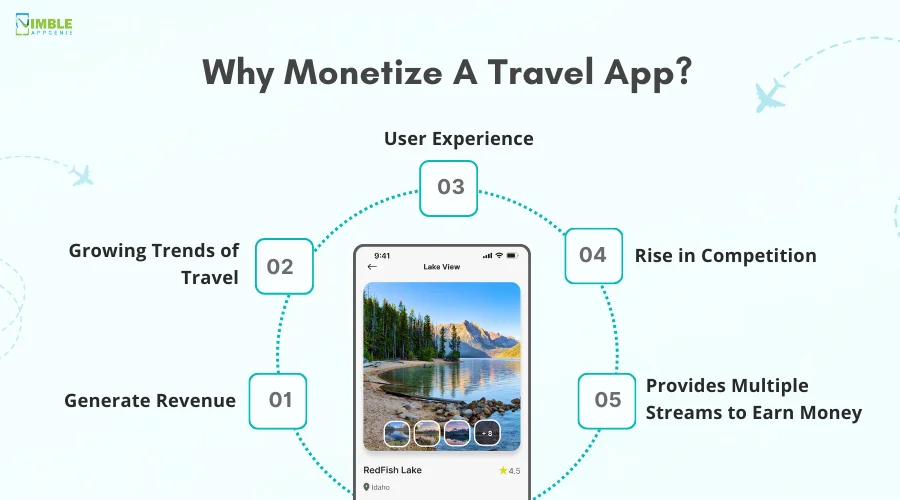
♦ Generate Revenue
One of the major reasons to adopt effective travel app monetization strategies is it helps in earning revenue. This revenue can be used to improve the operations of the app. Additionally, this revenue will add profits for you and your business.
♦ Growing Trends of Travel
Currently, the travel app market generates $629 billion in revenue, which is a 13% increase compared to the previous year. There were over 850 million people used a travel app in 2023. This number is continuously increasing which is a major factor in opting for monetization.
♦ User Experience
Monetization strategies can impact user experience. How? Well, an effective travel app monetization strategy will build trust among the users and retain them with the business. However, if the monetization is too excessive, it can restrict the users to pay for the service.
♦ Rise in Competition
Within the travel industry, it’s important to connect with a wide audience. Thus, creating a competitive travel app and adding monetization strategies to the same will help you lead the target audience. A suitable monetization framework will keep users engaged which may result in enhancing their confidence in the app.
♦ Provides Multiple Streams to Earn Money
You can enable users to help them access different payment methods that improve their experience with the app. Along with this, adding different monetization frameworks can be useful in earning money from various sources.
These were all the reasons to be considered to develop a travel app and adding monetization strategies to the same.
But what are the top monetization frameworks for travel apps to include in the current era?
Let’s move towards the following section.
Travel Apps Monetization Strategies
How to monetize a travel app?
There are many mediums and strategies to consider.
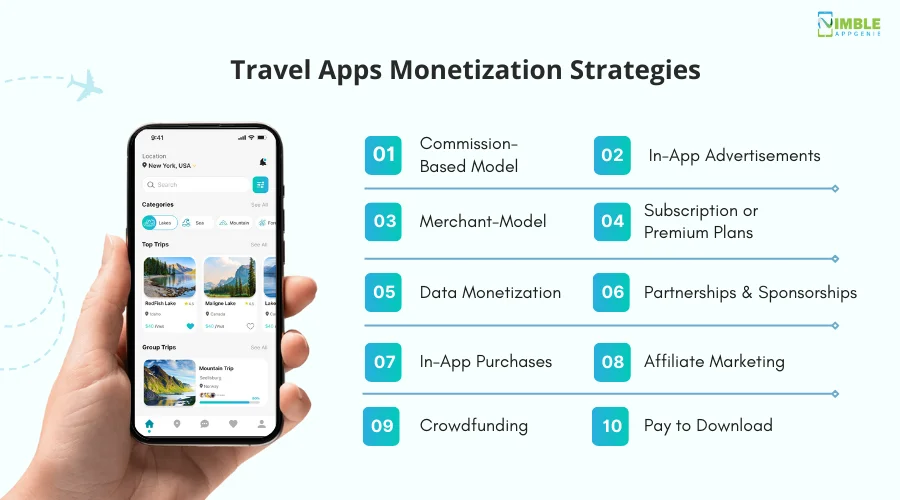
1. Commission-Based Model
The travel app provides the facilities for users to search for the best tourism spots, hotels, and restaurants, along with cab or taxi booking services. Thus, they earn a reasonable commission from the merchants and the users.
For instance, if you provide the service of searching hotels in a location, then for listing the hotels of that location, to your app, you can earn a small amount from getting them listed.
By listing thousands of hotels, restaurants, and taxi services, you can make a large amount of commission. This model acts as a permanent source of revenue while developing a travel app.
2. In-App Advertisements
In-app advertisements are a lucrative method for earning revenue via a large user base. Here, the advertisements can range from banners to video ads promoting travel-related accessories or other brands.
Within this travel app monetization strategy, you provide a space for the brands to promote their products and services over the platform.
Here, the developers integrate ads within the app, where they can generate income directly without even charging the users. This strategy will be effective only when your brand has a sufficient number of followers.
3. Merchant-Model
Within the merchant model, you purchase a block of hotels or other services in bulk from the providers or merchants. Then sell these services to the users at the margin and price based on the current market or as per your business terms.
Here the user can buy these services in bulk from you because the merchant might be selling them at high prices. Thus, in such a manner, you can earn a great amount of income from the end user. The profit margin in such cases is the difference between the amount at which bulk hotel rooms are bought and then the price at which they are sold.
The merchant model is generally effective when there are vacations, events, festivals, and other special days including anniversaries, birthdays, or wedding sessions.
4. Subscription or Premium Plans
This is a common travel app monetization strategy where the users subscribe to the service of hotels to book them in a peak season.
Many travel apps adopted these plans after offering freemium services for a certain point of time and then they start charging for the services. Here, users can access exclusive features or services including personalized travel itineraries, discounts on bookings, premium customer support, and much more.
These plans provide regular earnings to the travel apps. However, this model is useful only for frequent travelers. This will help them to know the places they can travel to this weekend or over any coming vacations.
5. Data Monetization
This can be a secondary travel app monetization framework to include in your app. Here, the data collected from the users such as their contact information, places they prefer the most to visit along with their current locations can be monetized.
However, here you need to ensure that this data should be kept personalized and can be shared only with the permission of the users.
You need to consider compliance with data protection laws like GDPR to not lose the trust of the users over the business.
6. Partnerships and Sponsorships
Under this money-making strategy for travel apps, you will be required to collaborate with local businesses including tour operators, guides, shops, and restaurants. In exchange, you can earn a commission from them to promote their services and operations.
Here, you can feature their services on your app and support the local economies to earn an attractive amount of revenue.
It only works when you partner with these brands and companies who pay you an amount to your business for endorsing their products and services.
7. In-App Purchases
It can be an important monetization strategy for travel apps, where the users provide an option to enhance the overall experience of the users via purchases and boost their app’s profitability.
Through in-app purchases, you can enhance the overall UX by offering additional content and functionalities that might go beyond the free version of the app.
This might further include downloadable city guides, access to local experiences, and travel gear recommendations based on past purchases.
8. Affiliate Marketing
Travel affiliate programs can assist publishers with a consistent supply of travel-related offers to be promoted across channels.
Additionally, these programs help the marketing affiliates to focus on the promotional side for generating revenue.
Under this strategy, you can promote other brands and their products or services through a link. This revenue-generating channel can help the brands by growing brand awareness, enhancing customer retention activities, and reaching new audiences.
9. Crowdfunding
Crowdfunding can be a suitable travel app monetization strategy useful for developing trust between the app’s owner and the app’s users. Additionally, for monetizing the apps, users can explicitly ask to donate a specific amount to the app, including some donation options to be introduced for the app’s users to choose from.
One of the major purposes of crowdfunding undertaking the idea or app that you have undertaken to make it better.
This strategy is effective if your travel business is at the entry stage. Here you have to offer the users a subsequent amount which can be termed as a dividend or interest.
10. Pay to Download
You might consider an important strategy of pay-to-download as a travel app monetization framework. Here the users need to pay a reasonable amount of charges for downloading the app.
This strategy should be suitable for a niche service within a travel app. Here you can earn a regular income with every download.
However, you should select the features that need to be premium here to retain users for the long run.
These are some of the important travel app revenue models to implement in your next project.
If you are still confused about adopting custom strategies for your travel app, let’s evaluate such frameworks used by the top companies in the next section.
Famous Travel Apps and Their Revenue Models
We understand that to develop a travel app, you need to know how your competitors are adding money-making strategies.
Well, we have already done it for you. Here’s a list of top travel apps and their monetization strategies.

► Kayak
Kayak is an app that covers hotel stays, rental cars, trains, and various other services. To develop an app like Kayak, you need to evaluate its monetization strategies comprises of revenue earned on referring customers to online travel companies, partnership models, and commissions.
► Airbnb
Airbnb makes the bulk of its revenue by renting out space in their homes or entire properties. Here guests can find cheaper accommodations when compared to hotels.
They earn revenue by charging money from both the guest and the hosts.
Bonus Read: How to Build an App Like Airbnb?
► TripAdvisor
TripAdvisor earns the majority of its revenue from online advertisements, including both click-based along subscription-based offerings.
Here the travel partners majorly are online travel agencies along with hotels that help them to earn a commission.
The cost to develop an app like Tripadvisor depends on the type and number of agencies you prefer to connect.
► Hopper
Hopper app makes money via different revenue models such as crowdfunding, data monetization, subscription plans, and affiliate marketing.
Their primary revenue generation model comes from commissions earned via hotels and airlines. The cost to build an app like Hopper will depend on the type of features you include within the software.
► Skyscanner
Skyscanner has an important monetization strategy, where they earn a great amount of commission or fees on every transaction made via the app. Other than this, the app makes money through advertisements.
Also Read: Develop a Website Like Skyscanner
► Tripit
Tripit travel app is very similar to TripCase for creating an organized itinerary. The app earns money via subscription plans that help the company generate recurring income from users who can opt for advanced features.
These are some of the examples to consider before you proceed to implement the travel app monetization strategies.
Well, are you puzzled about how to select the best monetization strategies for travel apps?
The following section deals with the steps, let’s learn them all.
How to Select the Best Monetization Strategies for Your Travel App?
When you proceed with adopting monetization strategies, selecting the appropriate one can be a challenge.
Here is a series of steps to count.
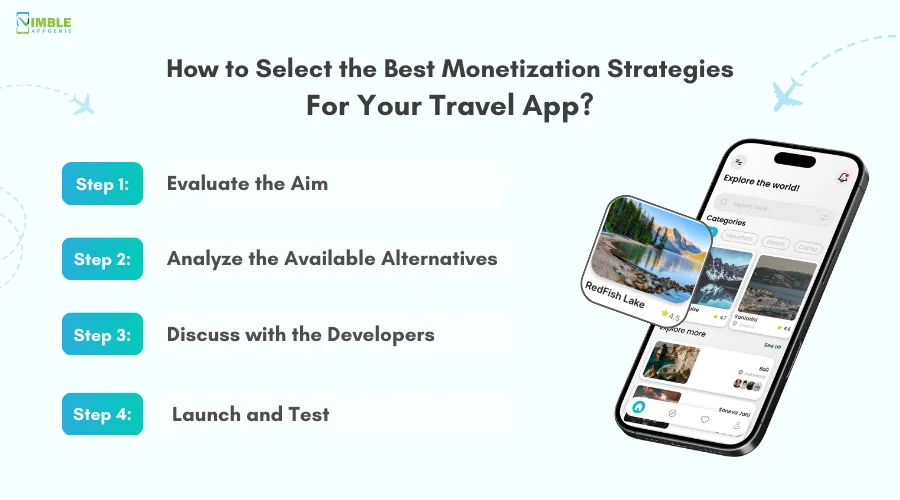
Step 1: Evaluate the Aim
Before selecting the prompt strategy for your travel app, you should know the objective for creating it. For instance, if it is based on the business model of Airbnb, you can go ahead with the commission-based model.
Step 2: Analyze the Available Alternatives
You need to identify the current alternatives related to travel app monetization frameworks. Along with this, you can match your aim with available alternatives, to identify the best monetization strategy for your project.
Step 3: Discuss with the Developers
Hire mobile app developers and discuss with them the important monetization strategies for your travel project. An experienced team will help you to identify a suitable framework and implement that too in your app.
Step 4: Launch and Test
After the launch of your travel app, you should test whether the implemented monetization framework is working effectively for your app or not. This will help identify the gaps left within app monetization and the users’ demand.
Well, if you are still bothered about how travel apps make money, connecting with an experienced company might be helpful.
How Can Nimble AppGenie Help in Monetizing a Travel App?
Our expert team will help you to identify and implement a suitable monetization strategy for a travel app.
Wondering where to find an experienced team?
Well, connect with Nimble AppGenie, our team is ready to help you with implementing the top monetization channels useful for your app to lead the industry.
We are the best Travel App Development Company focused on converting your project vision into reality.
Final Words
Travel is among the growing industries and their apps have become an important part of retaining and entertaining users in this world.
You should implement the top travel app monetization strategies for several reasons such as it helps generate revenue, enhances user experience, leads to a rise in competition, and provides different streams to earn money.
There are many monetization strategies to consider including merchant model, data monetization, pay to download, crowdfunding, partnerships and sponsorships, subscription plans, and premium models.
Connecting with an experienced company can assist you in implementing an effective framework.
FAQs

Niketan Sharma is the CTO of Nimble AppGenie, a prominent website and mobile app development company in the USA that is delivering excellence with a commitment to boosting business growth & maximizing customer satisfaction. He is a highly motivated individual who helps SMEs and startups grow in this dynamic market with the latest technology and innovation.
Table of Contents




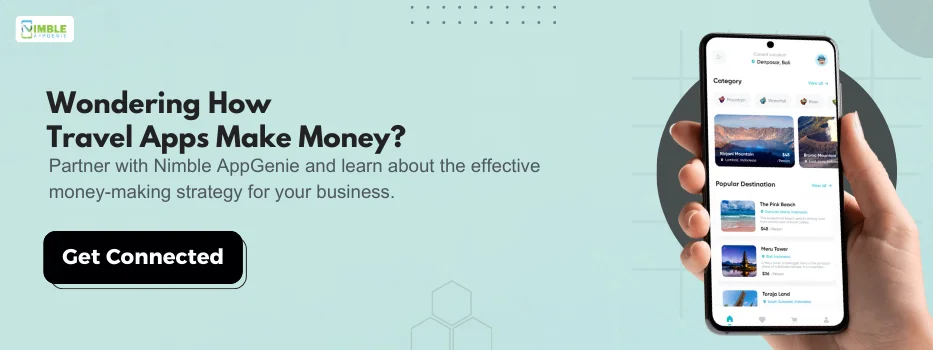
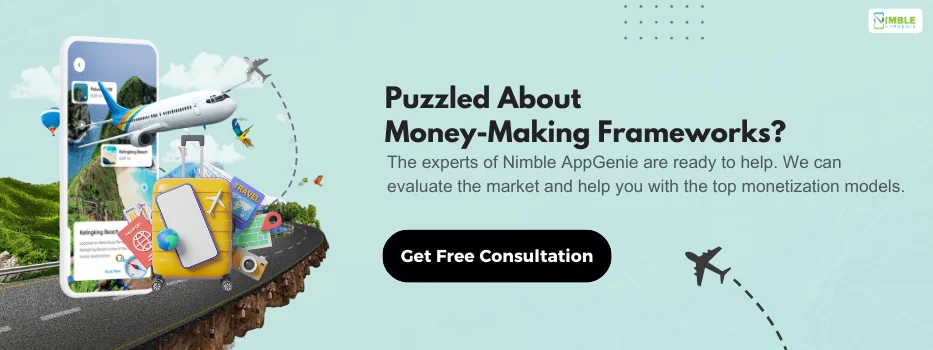
No Comments
Comments are closed.